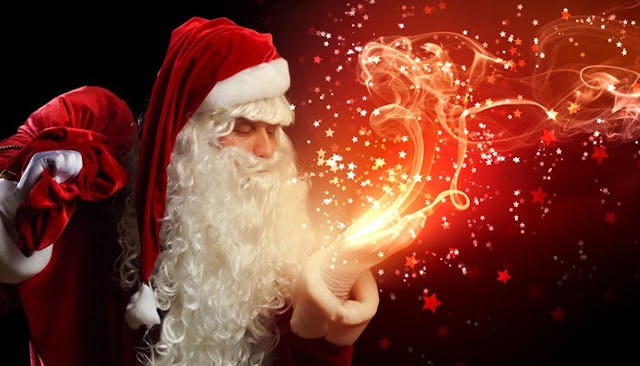The Myth of Santa Claus

The holidays are upon us, and I’m getting asked if I’m one of “those people.”
Which people, exactly? You mean the people who don’t lie to their kids?
My mother-in-law won’t like this. Neither will my parents, my husband, and some of my friends. But let’s seriously examine these arguments in favor of teaching the Santa Claus myth.
I know, I know—it’s “tradition.” So are a lot of things. That doesn’t necessarily make them good. If you’re referring to the sense of tradition that binds families and gives children fond memories, then I’m the first to admit that secular households tend to fall short in that department, as they don’t participate in the widespread traditions that adherent of organized religions do.
But every December, we get and decorate a fresh Christmas tree. I listen to Christmas music (Johnny Mathis, Peanuts, South Park) while I bake my favorite cookies—mocha crinkles, cranberry with white chocolate and macadamia nuts, oatmeal chocolate chip, and Jubilee Jumbles, which was my grandmother’s recipe. My son’s grandparents come to stay at our house on Christmas Eve. We eat a turkey that we’ve injected with some sort of alcoholic solution and deep fried, usually after I’ve stormed around the kitchen for several hours looking for the flavor injector that several months before I haphazardly threw in the toolbox in the garage. We have sausage-apple-cranberry stuffing and glazed carrots. We put wassail on the stove and open some presents. Sometimes we sing carols. And then my father reads our son “The Night Before Christmas,” as he always did for me when I was a girl. The next day, we open more presents, relax, and play all day long. And eat cookies.
All that? That’s tradition. It’s going to happen with or without Santa Claus.
I don’t want to keep the myth of Santa Claus from my son. I want to expose to him all types of stories from all parts of the world. But we don’t need to believe that a myth is factually true for our lives to be enriched by it. That’s kind of the point of myths; their power lies in their ability to inspire and delight us, not in their factual accuracy.
People who teach children that Santa Claus is real often argue that it’s the one true magical thing about being a child. Who would be so cold to take that away? In my opinion, that’s a terribly insular view. I’m not taking anything away from my child. He has a jolly holiday surrounded by loving family. If you’re suggesting that he’ll be somehow deprived and his childhood stunted, let’s look at the data—in other words, all the Jewish, Muslim, Buddhist, Baha’i, Wiccan, and atheist children who grew up to be reasonably competent adults despite going to bed one night a year without the expectation of a bounty of gifts from a fat man of Northern European descent who has landed on the roof with his eight magical reindeer and stuffed himself down the chimney.
My parents did the whole Santa Claus thing, and I don’t think it enriched my childhood at all. “Santa Claus” came to visit me a few times. He was played by my parents’ old neighbor Mr. Roller, and as far as I could tell, we didn’t have much in common. The cat tried to bite him. I was relatively young when I figured out that the whole thing was a ruse; Santa’s letters to me were looked suspiciously like my mom’s handwriting, and in them, he kept encouraging me to leave him tuna sandwiches (my dad’s favorite).
What I treasure from my childhood are those other holiday traditions: the tree, the carols, the cookies, my family.
I think the need to foist Santa Claus upon our children is a need for us to be children again—to suspend disbelief and regain an innocence we’ve long since lost. Personally, I don’t need that. I’m perfectly happy celebrating the return of the sun, the gathering of family, and the fact that I finally found that fucking turkey injector.
Isn’t that magical enough?
Related post: Having The Santa Claus Talk
This article was originally published on